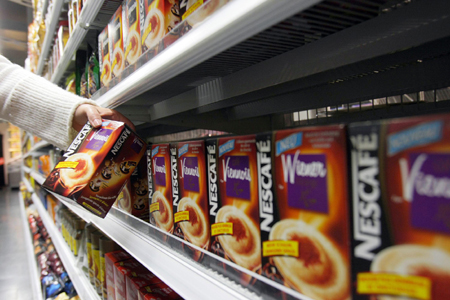Economy
Developing a taste for local coffee
By Yu Tianyu (China Daily)
Updated: 2010-11-15 10:13
 |
Large Medium Small |
Choosing Nescafe, produced by Nestle, at a grocery store in Zurich. Swiss-based Nestle SA, the world's largest food company by sales, recently added Nescafe Yunnan Arabica coffee to its beverage portfolio, pinning much hope on its success. [Photo / Bloomberg]
Yunnan, traditionally home to tea producers, becomes a hot bed of competition for rival drink

BEIJING - When Chinese people saw their first Nescafe commercial in the early 1980s with its slogan "The Taste is Good" on their old black-and-white television sets, it was thought unlikely they would take to the foreign drink made so far away from their own country with its deep-seated tradition of drinking tea.
However, it seems to have won people over and has led to the world's leading coffee makers growing the beans in Yunnan, the province regarded as the cradle of Pu'er tea.
China's southwestern Yunnan province is about the same latitude as some of the world's top coffee-producing regions and now accounts for 99 percent of China's total production of the energizing drink. The region is now a key front in the war between international coffee giants.
Recently, Swiss-based Nestle SA, the world's largest food company by sales, added Nescafe Yunnan Arabica coffee to its beverage portfolio, pinning much hope on its success.
The world's largest coffeehouse chain, Starbucks Corp, launched Yunnan-originated coffee products in January 2009. The exotically named South of the Clouds Blend is a mixture of whole beans grown in Yunnan and other Asia-Pacific regions.
During the first three quarters of 2010, coffee exports in Yunnan were worth about $85.9 million, an increase of $26.6 million compared with the same period in 2009, according to figures from Yunnan provincial government.
In addition, the plantation area was increased to more than 30,000 hectares in 2009 from 18,000 hectares in 2005.
Huang Jiaxiong, a researcher from Yunnan Academy of Agricultural Sciences, said: "The viable coffee-growing area in Yunnan is about 80,000 hectares. Only 30 percent of them have been exploited."
Coffee has become second only to oil as the world's second largest traded commodity.
"There is still much room for development as the coffee industry in Yunnan is expected to become a new pillar industry creating more than 10 billion yuan of output value," Huang added.
Huang said the advantage of Yunnan coffee lay in its unique flavor and aroma of fruit, herbal spiciness and strong but not very bitter coffee taste.
Adrian Ho, head of the coffee and beverages business unit at Nestle (China) Ltd, told China Daily that currently Nestle controls close to 80 percent of China's coffee market after coming to the market more than 20 years ago and gradually developing the business.
The company pioneered the making of Yunnan into a viable coffee-growing region in the late 1980s.
Wouter De Smet, manager of Nestle Coffee Agriculture Service (NAS), said the company in 1994 started a coffee development program based in Pu'er, in Yunnan, that focused on training and technical assistance.
So far, Nestle has invested about 50 million yuan into training local people free of charge, helping jump-start the Arabica coffee bean development in Yunnan and supporting farmers in improving the quality and yield of their plantations.
"We teach local farmers to check the price of coffee on the international market on the Internet so they can sell their coffee beans at an appropriate time at a fair price," said De Smet.
The company established a Nestle experimental and demonstration farm in 1997 covering an area of 60 hectares and started direct large-scale procurement of Arabica coffee from local farmers from 2002.
"Now, Nestle annually purchases around 3,000 to 5,000 tons of coffee in Yunnan," said Ho. "And, Nestle promises to make constant investments in the coffee sector in Yunnan."
In urban areas of the Chinese mainland, average annual per capita consumption is around 0.76 kilograms (kg) against Taiwan's annual per capita consumption of 0.95 kg, according to statistics by the International Coffee Organization (ICO)
"China has still much potential and we welcome more companies who have a long-term interest and commitment in developing the Chinese coffee market," said Ho. "I'm not concerned about maintaining market leadership - because Nestle does not only sell coffee products in China - but in developing Chinese coffee culture and also encouraging the habit of drinking coffee among Chinese consumers."
Many Chinese people have known of the Nestle brand since their childhoods and recall it nostalgically, Ho added.
According to Euromonitor International, coffee sales in China could reach $3.6 billon by 2011 from $ 2.4 billion in 2006.




